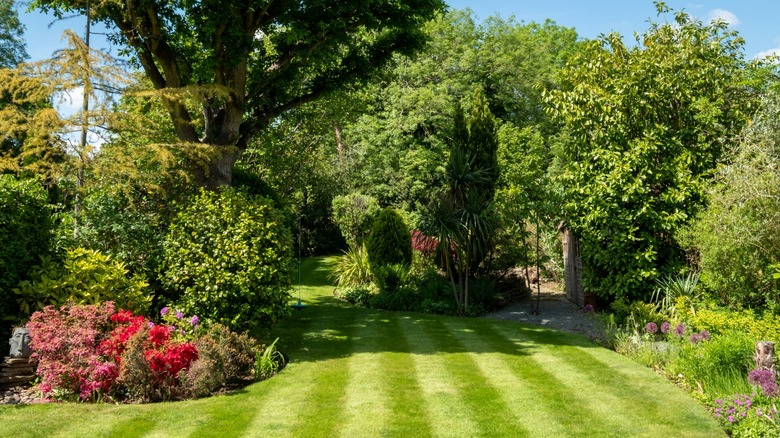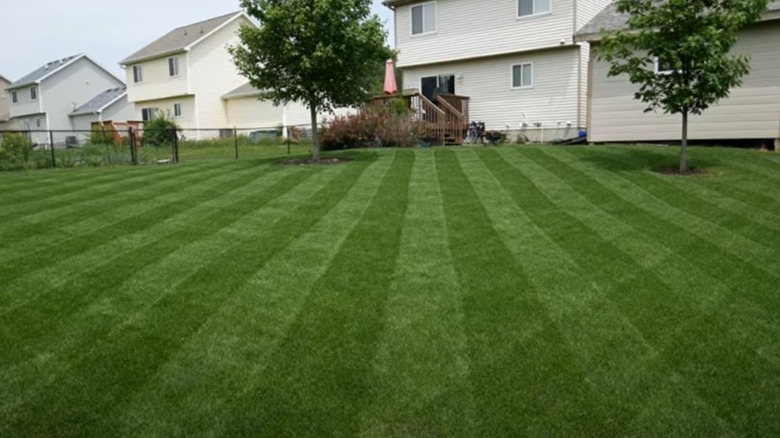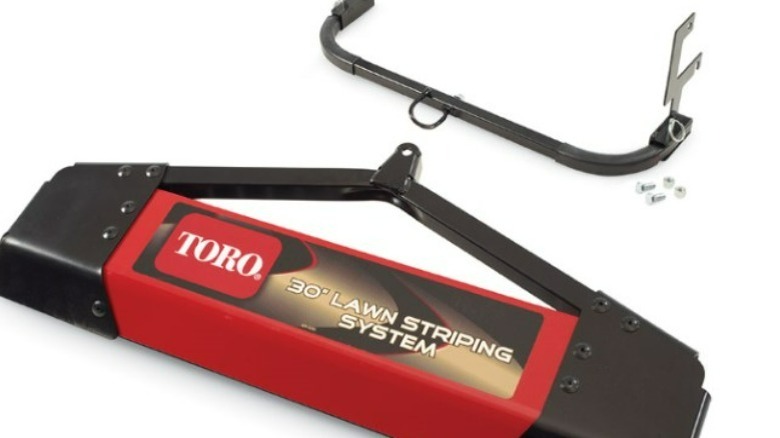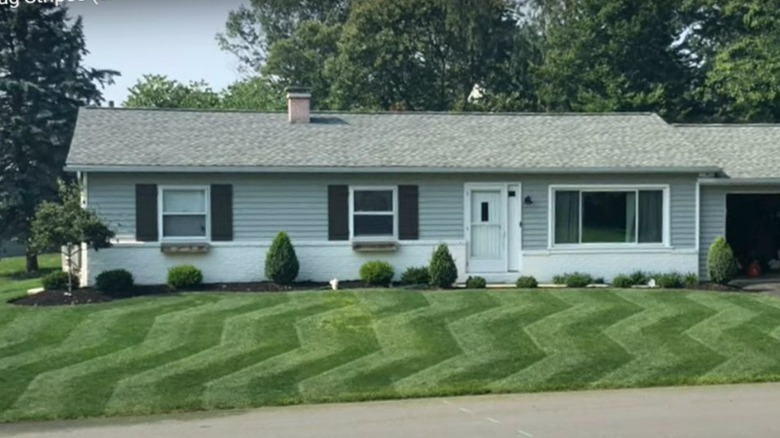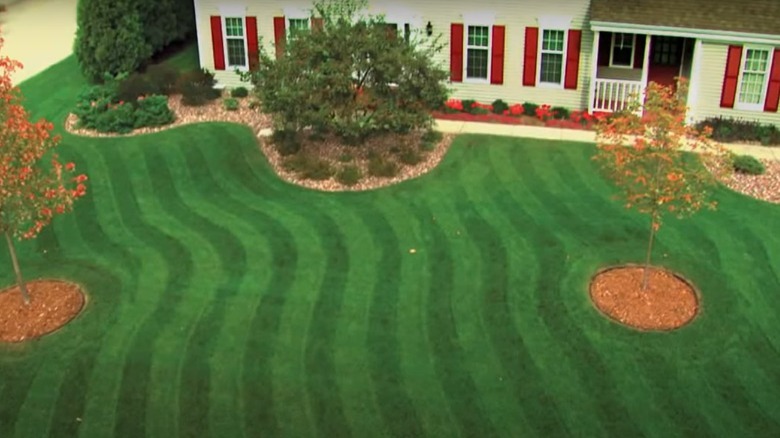5 Tips For Striping Your Lawn Like A Pro
While most of us just wonder how we can get a lush, green-looking lawn some people have moved past that and mastered the art of striping their lawns. We've all admired the lawn striping at sports stadiums and golf courses with patterns ranging from checkerboards and diagonals to zig zags. While you don't need an industrial-sized mower to make that happen in your own backyard, you do need to attach a lawn striping kit to your push lawnmower.
Before we talk about the method, let's look at what's actually happening to give a lawn that striped look. If you've ever swiped your hand across a piece of velvet, you will have noticed that the fabric looks lighter-colored in one direction and darker in the other. It's the same thing with grass. Scag Power Equipment explains that it all depends on which direction you're looking from as to whether the grass looks dark or light. This is because the blades of grass catch the light differently depending on which way they're bent. So get ready to set the bar high for your neighbors with the best tips to stripe your lawn like a pro.
Let there be stripes!
Since the blades of grass have to bend in order to really see the stripes, your lawn has to be of a certain length. Cool season varieties, like fescue, rye or bluegrass are better suited for this than others, explains the Milwaukee Journal Sentinel. Taller and thicker grass makes the striping effect more noticeable so it's important to keep the weeds out and let the grass grow up to 2 to 4 inches high before mowing, per Executive Lawn Care. The direction that the sun hits the blades of grass will also determine how strongly the stripes stand out — when the sun is directly overhead, they won't be as noticeable as when the sunlight hits the grass at an angle.
Ryan Knorr Lawn Care demonstrates how he gets the grass to bend using the Toro Lawn Striping System that attaches to any Toro mower. As you can see from the photo above, the lawn is beautifully striped!
It's all about the weight
There are several companies that manufacture lawn striping systems, also called kits, and there are various videos that show you how to make your own lawn striper using a PVC tube, such as this one from Ryan Knorr Lawn Care. A couple of the details to consider with a lawn striping system is the ease of maneuverability when you pull your mower back or when you try to mow around features in the garden.
Whether you buy a lawn striping roller or make your own, you will have to add sand or gravel to create the weight. Make sure to have a funnel on hand to make it faster and easier. According to Toro, you'll need to add 25 to 33 pounds depending on the density of the dry sand or gravel that you use. A lawn striping system that you attach to the back of your push mower cost costs between $100 and $200, depending on the brand. According to Big League Lawns, if you have a riding, tractor, or stand-on mower, you can also buy lawn striping attachments that typically range from $300 to $400.
How to get your strip started
Before you try the more complicated zig-zag pattern recommended by the Roosted Lawn Company, you will need to master the basics of a straight up and down pattern. Start by mowing the perimeter edge of your yard with, or without the roller kit attached to your mower. Then, mow up and down the full length of your yard in parallel, straight lines. When you've finished, mow the perimeter once again to get rid of any of the lines that were made as you turned the mower.
If you want to experiment with designs, another easy pattern to try is a checkerboard. this picks up where you left off after mowing up and down in one direction. You're now going to start at the perimeter of your yard and mow across the lines in the opposite direction. Always finish by mowing once again around the perimeter to smooth out any irregular marks.
Wavy patterns add dimension
When you're ready to try a more challenging stripe, like a wavy line or a zig zag, keep in mind the line of sight from where you or your neighbors will be able to see the pattern. While lawn striping is all about adding curb appeal, there is an element of getting everyone to see how good your lawn looks! According to Toro, if you create a pattern that is parallel to where you are standing, it will look more dramatic.
When you start to mow, look ahead at an object in the distance to help you mow a straighter line. If you want to create a circular pattern, for instance, around a tree, start at the feature rather than at the perimeter. Each time you complete a circle, turn and circle back the other way. In the end, you'll create a bulls-eye pattern. For a wavy pattern, you can use the end of a garden or a driveway as your sight line and just make a gentle waving pattern as you mow. When you turn back to mow in the other direction, use one side of the previous stripe to follow the same wave.
Healthy care tips for your lawn
According to Spartan Mowers, lawn striping promotes healthier lawns, because varying the direction in the way the grass is cut means that the sun won't always hit the grass in just one way. For the same reason, you should also vary the striping pattern every two weeks, which also prevents ruts from forming from the mower. Always mow your lawn when the grass is dry so it doesn't get torn or matted by the mower. In addition, mowing in the morning isn't the best time of day because there may still be dew on the grass.
A few other tips to keep your lawn healthy and looking good are to mow with a sharp blade, and only remove the top third of the grass blades, suggests Simplicity. Don't mow your lawn when it's dealing with a drought or very hot weather — if your grass is brown and crunchy, it probably doesn't need to be mowed. If you have to mow when the weather is hot, do it in the early evening when the sun starts to set, which gives your lawn time to recover overnight out of the direct sunlight.
